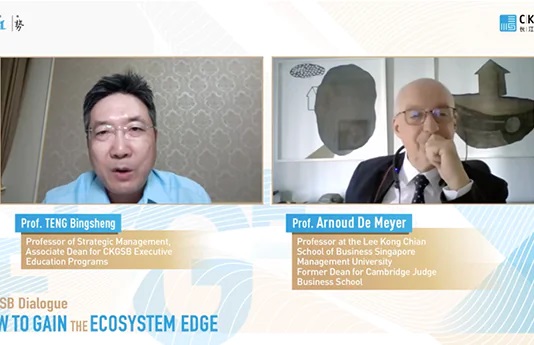Business has always been a team sport, but over the past two decades, teams have become a much more central concern for managers. Pushed by the automation of repetitive tasks and pulled by the need to innovate, many senior executives now believe that their future depends largely on the performance of their teams.
But although technology is advancing, people are not. From startups to Fortune 500 C-suites, the hard truth is that teamwork is a core incompetency in many organizations: in one recent survey of MBA students and MBA degree holders already out in the working world, only 29% said that their teams were organized in a way that gave them a three-quarter shot at success.
Why startups shut down
The MBAs’ experience isn’t exceptional. Many startups die young not because of a weak idea or a strong competitor but because of arguments between team members. “Between a third and a half collapse before they even get funded,” estimates Steve Blank of Pescadero, CA, a serial entrepreneur and an inventor of the lean startup methodology.
The most common cause is a fight between the founders over how to split the company’s equity, according to Blank. “Almost always, people go in saying, “‘Well, we’re all equal,’ and there’s usually someone who says, ‘No, no, no, I’m 2x more equal than you,’” Blank says.
Debates over roles usually follow close behind. “Who’s going to be the CEO?” Blank says. “Somebody has to be in charge and again, when you’re young, you usually have expectations of X.”
And even if the founders haven’t yielded to the temptation to turn a sliver of a hypothetical something into 100% of nothing, or to stomp out of the room unless they get Intergalactic Supreme Commander on their business card, ordinary communication problems can still hold a startup back.
In particular, Blank notes, many startups underperform because of bad communication between the CEO and the rest of the executive team, usually because the leader isn’t listening. “In the early stages, there’s no possible way you can be smarter than the collective intelligence of your company and your customers,” he warns.
When he visits startups, Blank pays attention to how much the CEO lets the rest of the team talk: “The mistake we used to make and still make is thinking that somehow the founder has gotten insights from God,” Typically, Blank says, behind every Steve Jobs, there’s a Steve Wozniak – a sales person and a technical person: if it weren’t for J. B. Straubel, we would never have heard of Elon Musk.
The size of the founding team also seems to affect the company’s chances of success. Noam Wasserman, a Professor of Clinical Entrepreneurship at the University of Southern California, director of USC’s Founders Central Initiative, and author of Life is a Startup, found in earlier research that founding teams of one or four or more fail significantly more often than teams of two or three.
His theory? The chances are high a single founder will lack all the skills the firm needs to succeed, while four or more are more likely to have more interpersonal tensions.
The structure of the core team often leads to difficulties too. Among startups, the challenge is making sure the group has the right mix of skills. Often, the company goes wrong by hiring too many people who resemble the founders.The result, Wasserman warns, is that founding teams often end up “witha surplus of ‘builders’ who can’t sell, or ‘sellers’ who can’t build.”
Unfortunately, startups don’t have the market on dysfunction cornered. Teams at established organizations have their own challenges too.
A survey by ThinkWise, a Dutch software firm, found that respondents from organizations with fewer than 100 employees were more likely to believe that their team was operating to the best of its ability than either those of mid-size (100-1000 employees) or large (1000+ employees) firms. However, even respondents from small firms were not overly enthusiastic: only 52% believe their team is living up to its potential. That’s admittedly better than 35% for the mid-sized and 39% for the large companies, but it still means that in the very best case, half the staff feels that their teams could be doing better.
It’s not just the size of the company that matters; the size of the team does too. In the same survey, ThinkWise found that while 50% of respondents on a team of fewer than ten people rated their team as performing at its full potential, only 36% of teams between 10 and50 were similarly positive– and only 14% of those with more than 50 members.
Nor does it get any better further up the corporate ladder.Team dynamics are a huge problem among senior executives, says Ray Williams, an author and executive coachbased in Vancouver, B.C. “Often there can be a kind of jockeying amongst the senior administrators in a senior team where one’s trying to outdo the other one for attention from the CEO or the president,” he says.
Interestingly, at this level, even something as simple as building a consensus on what a given meeting should be about is often tough. One McKinsey & Co. surveyfound that only 35% of senior executives believed their top teams allocated their time correctly among the various topics they had to consider – and only 38% thought they focused on work that truly benefited from an executive perspective.
Most executives appear to handle these frustrations the easy way – by working together as little as possible. A recent Deloitte surveyfound that c-suite executives seldom collaborate with executives in other functions. Although 85% of respondents agreed that C-Suite collaboration is either important or very important, most (73%) said that their own C-suite leaders “rarely, if ever” collaborate with each other on projects or initiatives.
Beyond project failures, dysfunctional teams produce other negative dividends as well:
-Unhappy teams have higher turnover. It’s well-known that people often leave jobs because of their boss (nearly two-thirdshave either left a job or are considering leaving because they don’t like their immediate supervisor), but co-workers are a second important reason: one survey found that one-third of employeessay they work with a colleague who makes them want to quit.
-Roughly 70% of all mergers and acquisitions fail to meet financial expectations. The reason: research by Pearl HPS, a maker of team analytics software based in Silicon Valley, found that as much as 80-90% of their outcome depends not on leadership but the performance of their teams.
-One recent EY studyfound that executives at companies growing more than 10% EBITDA per year are much likelier to rate their organization’s team-management ability as good or excellent (72.6%) than executives at companies that are either not growing or shrinking (49%).
However, despite the evidence that teams are crucial to company success, the state of teamwork may be getting worse. Gene Tange, CEO and founder of PearlHPS, says that many businesses face a growing number of complex global challenges and have increasingly overstretched groups of senior employees to cope with them — hardly a promising recipe for success.
In Part 2of Go Team! we take a closer look at why business teams have such a hard time getting along, and what can be done to improve their performance.

















